 Back to selection
Back to selection
25 NEW FACES – PART 3
Zac Stuart-Pontier
If you go to the website of Zac Stuart-Pontier (zac-edits.com), your browser heading will display the following: “Zac edits really, really, really well.” This cheeky claim was earned in early 2010 when the three feature documentaries that Zac had been working on since he graduated NYU in 2006 premiered within a month of each other: Jody Lee Lipes and Henry Joost’s NY Export: Opus Jazz, which premiered on PBS and took to the festival circuit with gusto in March, via SXSW; James Rasin’s biographical doc Beautiful Darling,about the Warhol superstar Candy Darling and the loves she left behind, which premiered at Berlin and ND/NF; and the Sundance sensation Catfish, which chronicles the twists and turns of a Facebook romance.
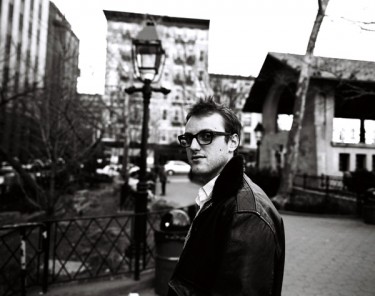
- ZAC STUART-PONTIER. PHOTO BY MARC SMERLING
“The reception of Catfish was a trip,” says Stuart-Pontier. “Working on it for years, you become desensitized to the story, so when people have a reaction like that, it’s just amazing.” As his edits have progressed, Stuart-Pontier has consistently taken on a bigger role in his productions, earning himself co-producer credits on both Catfish and Beautiful Darling. He has also been an assistant director, chiefly on Cannes selections Afterschool (directed by Antonio Campos) and Two Gates of Sleep (directed by Alistair Banks Griffin), but also on some of the same commercials and music videos that he edits. “That’s perfect, because I can be on set and say, ‘Guys, I’m never gonna use this shot. Let’s cut it.’” Stuart-Pontier says he has a difficult time sitting back when there’s work to be done. “It’s hard for me to stop working on something; it feels like admitting defeat. It feels like, ‘I wasn’t able to solve this problem.’”
Growing up in Narrowsburg, N.Y., his parents ran the local newspaper together, which is where he was first bit with the story bug “learning to write news, what information you give first, how you introduce the characters.” He writes a weekly column for the River Reporter about his life, begun during college at the behest of his mother, and credits it with keeping his creative brain turned on while focused so intently on other people’s projects.
“I love documentaries — I enjoy having to find that and the process of pulling out what the story is. What I’ve learned the most is not to try to force anything. Shaping the story around what is there is much more powerful than trying to mold the footage into your preconceived idea.” — Alicia Van Couvering
Contact: Mira Yong at Gersh: (212) 634-8157
Holden Abigail Osborne
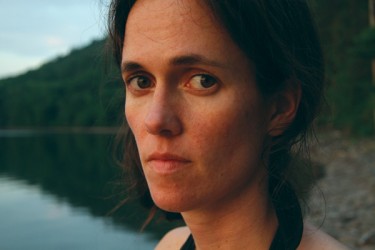
In February 2009, Holden Abigail Osborne’s brother Zach was released from prison and put under house arrest. In grad school at NYU Film School, Osborne grabbed a camera and jumped on a plane to Missouri. She wouldn’t understand why she had done it until the short film the footage became was completed. “It was my form of intervention,” she says.
The result was Solitary/Release, a two-part short film that premiered at SXSW this year. Solitary is a documentary about her brother transitioning back into society while under house arrest, navigating a complex reentry into the lives of his family after serving time in prison. Release is a narrative starring James Franco as Zach and Holmes Osborne (Holden’s actual father) as Zach’s dad, who has chained him to the ground in a decrepit outdoor living space with a floor of leaves and a hot plate. Release serves as an imagined redemption, a surreal visual metaphor anchored by Franco’s slightly brutal performance.
“I wasn’t sure in the beginning that the two pieces would play together,” remembers Osborne, “but I think the pieces need each other.” Her brother was intimately involved in the process. For Zach, “the movie is heartbreaking, in that it reminds him of how powerful a challenge he faces, but also hopeful, in that it points towards the possibility of a new life.” The film will play a host of festivals around the country, but more important for Osborne is touring the film to addiction treatment centers. “One of my initial goals with the film was to start a conversation in my own family about how we could take control of an extremely difficult problem,” she says.
Osborne grew up in tiny Bates City, Mo., and studied government in college, thinking that she should focus on a stable career. On a whim, she auditioned and was cast in a play by Sam Shepard, and soon she was making films. An editor on PBS’ The Quiltmakers of Gee’s Bend and head producer for Wieden + Kennedy China for a year, she has one year left at NYU. Another short film and two features are under way. Without being didactic, all of them have larger issues at stake than your standard boy-meets-girl fare. “The only way that I can justify being a filmmaker is by telling stories that have a purpose, by making films that have a life beyond the screen. I think this little life we’re all trying to live can be just so excruciatingly difficult, so I make films to shine a little light; to let people know they’re not alone.” — A.V.C.
Contact: haofilms at gmail dot com; haofilms.com
David Wilson
You may know David Wilson best as the co-founder of the True/False Film Festival with Paul Sturtz. But in the seven years the well-loved documentary fest has been steadily increasing its visibility, Wilson has also been quietly honing his skills as a filmmaker.
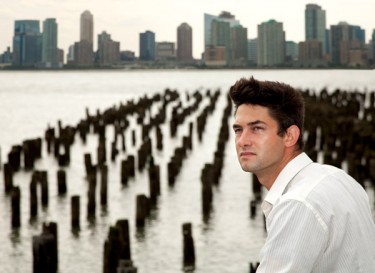
- DAVID WILSON. PHOTO BY RICHARD KOEK
In 1996, after graduating from Hampshire College in Massachusetts and spending some time working on films in New York City, he returned to his hometown of Columbia, Mo., to make the short Magic City, which looks at the underground youth culture in the state. He followed that by spending the next few years helping to start up an independent movie theater, Ragtag Cinema, in his hometown. Then in 2003, he went back to filmmaking, creating short movies for the experimental opera The Nitrate Hymnal. But Missouri came calling again shortly after as he and Sturtz started True/False in Columbia in 2004.
“I’ve kind of been distracted from being a filmmaker for a while,” Wilson, 35, admits. However, recently Wilson has gotten the urge. For the last few years he’s been working on a feature-length doc with fellow doc filmmaker AJ Schnack (Kurt Cobain: About a Son) that follows four families living in Branson, Mo. They hope to premiere it on the festival circuit next year. He also shot some of the footage in Schnack’s Convention, a look at the 2008 Democratic National Convention.
But what’s recently caught people’s eye to his work is his intimate short doc on bird-watching, Big Birding Day, which premiered at SXSW earlier this year. Wilson chronicles Chris Hitt and Marty Riback (who happens to be Wilson’s uncle) as they try to break a bird-watching record. Shot on two Panasonic HVX cameras with wide-angle lens adapters, Wilson captures beautiful shots of the Mexico and Oklahoma wilderness while showcasing the enjoyment these friends have doing something they love. “Some people need to know numbers; they want to know how many [birds] they saw,” says Wilson, who purposely left out a tally. “I don’t mind frustrating those people. It’s an affectionate film about fun people, and I hope people take it in that spirit.”
The film is also about small-town life, which has been a theme throughout Wilson’s work. “I’m interested in the margins,” he says. “I think one of the most interesting margins is where I come from, the Midwest — the kinds of stories in the small towns that you don’t often see. You see a lot of stories about New York and Los Angeles, but there’s room to tell these other stories.” — Jason Guerrasio
Contact: david at truefalse dot org
Radical Friend
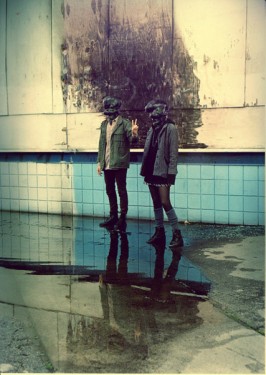
- RADICAL FRIEND. PHOTO BY CHRIS SANCHEZ
Directors Julia Grigorian and Kirby McClure, who collaborate together as Radical Friend, are following their string of innovative music videos with their biggest project yet, but you probably won’t see it on YouTube anytime soon. Following up on the technological experimentation of their videos for groups like Black Moth Super Rainbow and Yeasayer, Radical Friend has been commissioned by the Creators Project (a collaboration between Vice magazine and Intel) to make something that seems part atavistic ritual, part Cronenbergian cyber-humanism. Writes the duo in an e-mail, “Our project is The Digital Flesh, and it’s very much aligned with our video directing sensibilities, but just out in the tangible world. We are building temples across the globe (at each Vice/Creator’s Project Event) where you can enter and be three-dimensionally scanned. After enough scans have been collected we will assemble them together to become part of a giant third organism that will be summoned and holographically projected in Beijing. The experience has a kind of ritualistic/neon funeral vibe, where you are sacrificing flesh and committing yourself to becoming part of something much bigger: an electronic organism. The project evolves from city to city and you can watch and interact with this organism as it incubates on the website.”
The L.A.-based Radical Friend met in art school and instantly became collaborators, on art projects and then, after they were discovered by the band Of Montreal, on videos. “It’s pretty rewarding to make experimental work that can be considered pop culture,” they write. “We made this weird animation in our bedroom and it was all over TV and the Internet, so we continued on that path, and new opportunities started coming our way afterwards.” Of the nature of their collaboration, they write, “Whenever we think we have our roles figured out it changes. We’re back and forth between one of us being more visually and technically inclined and the other more conceptual and character inclined. It can change several times throughout a project, but no one would ever know because it happens very organically.”
Next up for the duo: finishing a short film with VFX artist Seb Caudron (City of Lost Children), and then a short narrative film about suburban teens who make themselves into shamans and sacrifice the body of a young girl. They write, “We really crave mythology, and see society and our way of life as a succession of rituals or metaphors. Something as mundane as suburban life has so much more depth than meets the eye.” — Scott Macaulay
Contact: radicalfriend.com
Marc Fratello
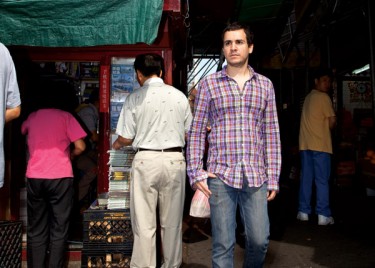
- MARC FRATELLO. PHOTO BY RICHARD KOEK
Winner of the Focus Features Best Film Award at the 2010 Columbia University Film Festival, the Student Choice Award, and an Audience Award, Babyland by Marc Fratello is one of the most devastating shorts you’ll see all year. It starts off like a blue-collar version of a Nicole Holofcener film, or perhaps one by Todd Solondz. By day, a lonely young upstate New York woman (played beautifully by Marielena Logsdon) trolls baby boutiques and children’s bookstores, connecting with fellow mothers-to-be. The only thing is, the slight bulge in her blouse is only padding. She’s not pregnant. But such is her own lack of identity and the pull of her small town’s mommy culture that the only way she knows how to fit in is by becoming an expectant mother as well. By night, her efforts to assimilate grow more serious as she cruises local bars, picks up guys and tries to get pregnant. One day, she wrangles an invitation to a friend’s cookie swap where everyone seems to be with child. Breaking down, she calls it the happiest day of her life… I won’t reveal what happens next, but the film seamlessly and unexpectedly moves from social satire to pure heartbreak.
“It was a long process [writing the script],” admits Fratello. “There were two sources of inspiration: a story about a woman who stalks pregnant women, and a website devoted to cookie swaps. With those two things I had a character within a world, and finally, after I put [the script] down for a while, the film became about identity. A lot of us grow up sort of nowhere, and it’s easy to latch on to whatever happens to be around, whether it’s religion or sports or mommy culture.” Fratello, who grew up in Atlanta, Ga., says that of all the people in the film, he identifies most with his protagonist. “She reminded me of being young and forced to go on religious retreats. I would think, ‘Why am I here?’”
Babyland shot for 10 days in Hudson, N.Y., and Fratello says the short’s mixture of “humor, drama and tragedy was difficult to modulate.” There was another problem: length. Babyland clocks in at 25 minutes. “That is frowned upon,” he says. “It makes it difficult to be programmed [by festivals]. But I tried cutting it down and it became absurd. To pull off the ending you need to spend time with her.”
Before embarking on film, Fratello worked in theater, graduating from NYU’s Tisch School of the Arts and studying directing and acting at Playwrights Horizon’s Theater School and the Royal Academy of Dramatic Arts in London. He directed plays by Mac Wellman and worked briefly in L.A. as a development assistant for Penny Marshall’s Parkway Productions. Finally, though, he landed in film at Columbia University’s School of the Arts. In terms of influences, Fratello says, “I’ve always been drawn to directors who love imperfect characters. I like John Schlesinger, Werner Herzog, Woody Allen, Robert Altman, Alexander Payne, Lynne Ramsay and Todd Solondz. But I’ve always been inspired by comedy, from Monty Python to Peter Sellers to Christopher Guest.”
Fratello, who says he is developing a true-crime feature with a classmate, just graduated this year and had planned to “lay low for three or four months. But the wheels have suddenly started turning a lot faster than I was planning for.” — S.M.
Contact: marcusfrat at gmail dot com
